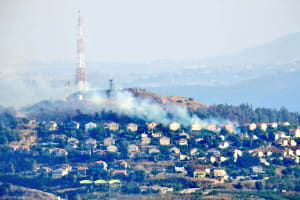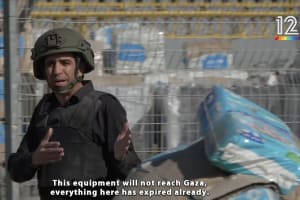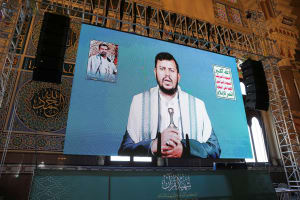‘Lebanon will soon pay price for Hezbollah terrorism,’ former War Cabinet Minister Gantz warns European ambassadors
Relatively quiet day on northern border ends with several Hezbollah attacks in the evening

“If there is no agreement in the north, the state of Lebanon will soon begin to pay the price for Hezbollah’s terrorism,” former War Cabinet member Benny Gantz warned European ambassadors on Monday.
Speaking at a briefing organized by ELNET, the pro-Israel European Leadership Network, the National Unity party chairman warned the conflict in Israel’s north might soon come to a head if a diplomatic solution isn’t reached.
The briefing, led by Gantz, who left the unity government recently, also conveyed that Israel's opposition parties share the same position as the right-wing government on this issue.
Meanwhile, diplomatic efforts led by the United States are reportedly set to continue on Wednesday, as Lebanese news outlets said the U.S. special envoy Amos Hochstein would travel to Paris to speak with French officials.
While Israel initially saw relatively few attacks by Hezbollah on Monday, the group later launched several attacks in the early evening hours. At the time of publication, Hezbollah had only taken responsibility for two attacks.
Hezbollah has officially announced some of its attacks, while also striking Israel without claiming responsibility. In addition, allied terror groups have launched attacks on Israel on Hezbollah's behalf.
Early Monday morning, siren alerts were sounded in Metula, a mostly evacuated town in the Upper Galilee. In the afternoon, Israeli media reported that a rocket struck a home without causing injuries.
In the early evening, sirens were sounded in Ramot Naftali and in Dovev, with one rocket landing in open areas nearby.
Later, five projectiles were launched near Maayan Baruch, activating sirens, however, all of them fell in open areas without causing injuries. Two additional rockets were intercepted after rocket alarms were activated in Tel Hai and Kfar Giladi.
מטוסי קרב תקפו לאורך הלילה מטרות של ארגון הטרור חיזבאללה בדרום לבנון, בהן מבנים צבאיים במרחב הכפר כילא ותשתיות טרור במרחבים חולא, אל ביידא ורב א-תלתין שבדרום לבנון.
— צבא ההגנה לישראל (@idfonline) July 1, 2024
בנוסף, כוחות צה"ל ביצעו ירי ארטילרי להסרת איום למרחב א-דהירה שבדרום לבנון pic.twitter.com/RKZ10a4J7k
On Monday morning, Israel Defense Forces stated it had attacked Hezbollah positions in southern Lebanon throughout the night, including military buildings near Kafr Kila, Khoula, al-Bayda and Rab a-Thalathin.
IDF troops also opened artillery fire at Hezbollah troops to remove an imminent threat posed in the area of a-Dahira.
Another wave of IDF strikes later targeted Hezbollah positions in Ayta al-Shaab, Markaba, Houla and, again, in Kafr Kila.
כוחות חטיבת האש של אוגדה 91 זיהו מוקדם יותר היום מחבלים נכנסים למבנה צבאי של ארגון הטרור חיזבאללה במרחב בליידא שבדרום לבנון.
— צבא ההגנה לישראל (@idfonline) July 1, 2024
בסגירת מעגל מהירה, זמן קצר לאחר הזיהוי, מטוסי קרב של חיל האוויר תקפו את המבנה בו שהו המחבלים pic.twitter.com/mWFz3W2mmq
After two similar operations the day before, the IDF said it spotted and struck a terror squad of Hezbollah once again, this time near Blayda.
In quick cooperation, troops of the IDF’s 91st Division alerted Israeli Air Force (IAF) fighter jets which, within minutes, struck the building where the terrorists were gathered.
During Gantz’s comments to the ambassadors, he stressed that Israel would not allow the situation in the north to continue, while also doing everything to prevent a return to the situation before Oct. 7.
“We will not accept that 14 commando battalions can raid our villages within an hour’s decision. It will not happen,” Gantz emphasized, referring to Hezbollah’s elite Radwan Force which has boasted about its ability to invade northern Israel.
“I was the last Israeli to leave Lebanon and cross the border back to Israel. I spent 22 years of my life there. Half of my military career,” said Gantz, who served as an officer during the Israeli occupation of the security zone in southern Lebanon from 1985 until 2000.
“So far Lebanon has not paid the price of this war and soon they will start paying the price. They have the responsibility to make sure that Hezbollah stops its aggression and Hezbollah has to decide whether it is an Iranian branch or a Lebanese organization and pay the price for its decisions.”
Gantz noted that the Iranian regime was the “cornerstone” of regional instability, supporting Hezbollah, Palestinian terrorism and militias in Iraq, Syria and Yemen, among other places.
“In the face of this aggression, appeasement is not an option. The world needs to understand that if it does not pursue Iran, Iran will pursue it. I don't think we can ignore it. I know it’s inconvenient. I know it takes effort and I know it could lead to an escalation that everyone would like to avoid, but that’s the reality,” Gantz concluded.

The All Israel News Staff is a team of journalists in Israel.
You might also like to read this:














